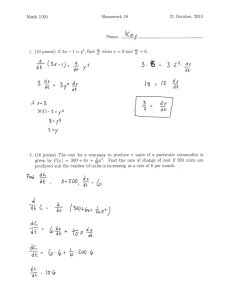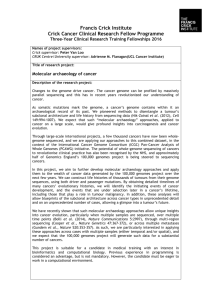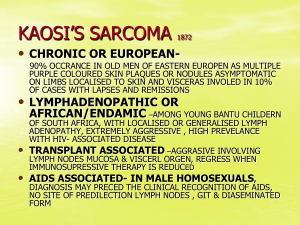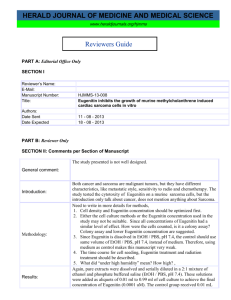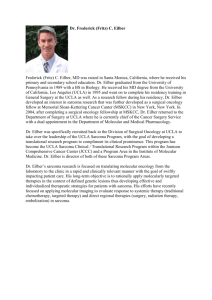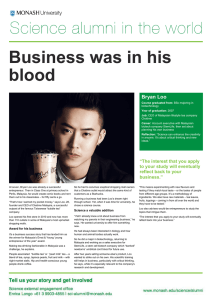Sarcoma represents only 2% of all cancers and the 100,000... opportunity to gain insight into the development of these rare... Translating whole genome sequences of 500 sarcomas into clinical practice
advertisement
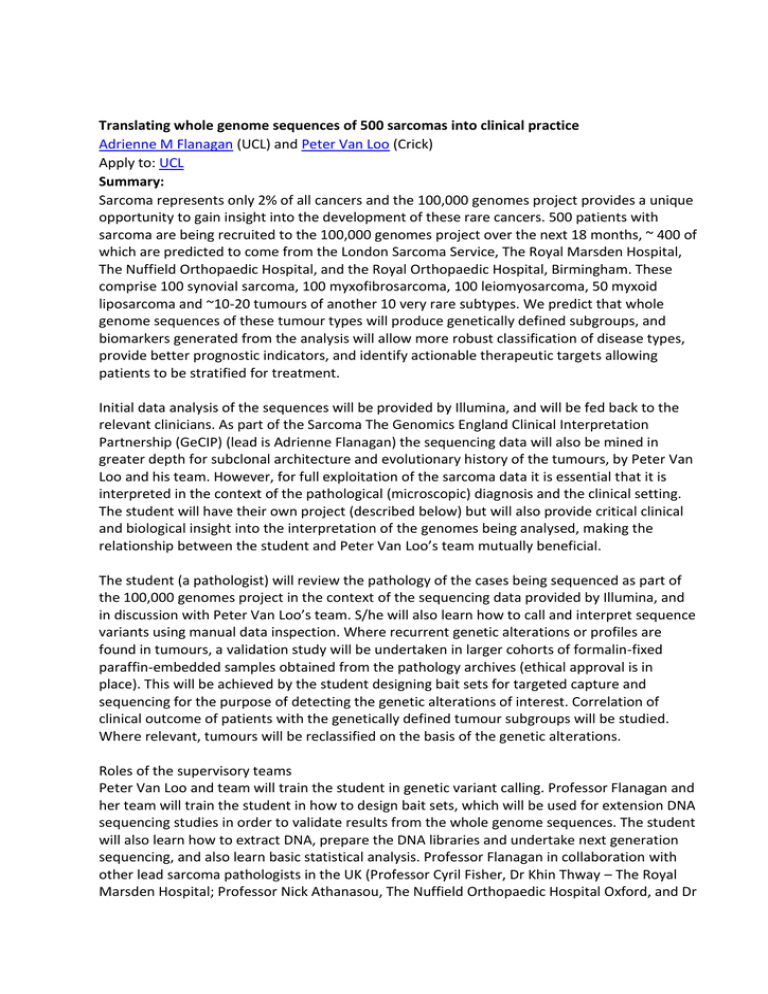
Translating whole genome sequences of 500 sarcomas into clinical practice Adrienne M Flanagan (UCL) and Peter Van Loo (Crick) Apply to: UCL Summary: Sarcoma represents only 2% of all cancers and the 100,000 genomes project provides a unique opportunity to gain insight into the development of these rare cancers. 500 patients with sarcoma are being recruited to the 100,000 genomes project over the next 18 months, ~ 400 of which are predicted to come from the London Sarcoma Service, The Royal Marsden Hospital, The Nuffield Orthopaedic Hospital, and the Royal Orthopaedic Hospital, Birmingham. These comprise 100 synovial sarcoma, 100 myxofibrosarcoma, 100 leiomyosarcoma, 50 myxoid liposarcoma and ~10-20 tumours of another 10 very rare subtypes. We predict that whole genome sequences of these tumour types will produce genetically defined subgroups, and biomarkers generated from the analysis will allow more robust classification of disease types, provide better prognostic indicators, and identify actionable therapeutic targets allowing patients to be stratified for treatment. Initial data analysis of the sequences will be provided by Illumina, and will be fed back to the relevant clinicians. As part of the Sarcoma The Genomics England Clinical Interpretation Partnership (GeCIP) (lead is Adrienne Flanagan) the sequencing data will also be mined in greater depth for subclonal architecture and evolutionary history of the tumours, by Peter Van Loo and his team. However, for full exploitation of the sarcoma data it is essential that it is interpreted in the context of the pathological (microscopic) diagnosis and the clinical setting. The student will have their own project (described below) but will also provide critical clinical and biological insight into the interpretation of the genomes being analysed, making the relationship between the student and Peter Van Loo’s team mutually beneficial. The student (a pathologist) will review the pathology of the cases being sequenced as part of the 100,000 genomes project in the context of the sequencing data provided by Illumina, and in discussion with Peter Van Loo’s team. S/he will also learn how to call and interpret sequence variants using manual data inspection. Where recurrent genetic alterations or profiles are found in tumours, a validation study will be undertaken in larger cohorts of formalin-fixed paraffin-embedded samples obtained from the pathology archives (ethical approval is in place). This will be achieved by the student designing bait sets for targeted capture and sequencing for the purpose of detecting the genetic alterations of interest. Correlation of clinical outcome of patients with the genetically defined tumour subgroups will be studied. Where relevant, tumours will be reclassified on the basis of the genetic alterations. Roles of the supervisory teams Peter Van Loo and team will train the student in genetic variant calling. Professor Flanagan and her team will train the student in how to design bait sets, which will be used for extension DNA sequencing studies in order to validate results from the whole genome sequences. The student will also learn how to extract DNA, prepare the DNA libraries and undertake next generation sequencing, and also learn basic statistical analysis. Professor Flanagan in collaboration with other lead sarcoma pathologists in the UK (Professor Cyril Fisher, Dr Khin Thway – The Royal Marsden Hospital; Professor Nick Athanasou, The Nuffield Orthopaedic Hospital Oxford, and Dr Sumathi Vaiyapuri, The Royal Orthopaedic Hospital, Birmingham, and others) who will contribute the majority of the sarcoma cases to the 100,000 genomes project, will provide expertise in review of the cases. They will also provide access to archived samples, and work together to improve classification of disease for patient benefit. The proposed project fulfils the experimental medicine remit of the scheme in that the student will potentially identify new diagnostic and prognostic biomarkers for sarcoma that if validated in a larger cohort can be introduced into clinical practice. References: 1. Amary MF, Damato S, Halai D, Eskandarpour M, Berisha F, Bonar F, McCarthy S, Fantin VR, Straley KS, Lobo S, Aston W, Green CL, Gale RE, Tirabosco R, Futreal A, Campbell P, Presneau N, Flanagan AM (2011) Ollier disease and Maffuci syndrome are caused by somatic mosaic mutations of IDH1 and IDH2. Nat Genet. Nov 6;43(12):1262-5. 2. Pillay N, Plagnol V, Tarpey PS, Lobo S, Presneau N, Szuhai K, Halai D, Berisha F, Cannon SR, Mead S, Kasperavicute D, Palmen J, Talmud P, Kindblom LG, Amary MF, Tirabosco R, Flanagan AM (2012) A common single nucleotide variant in T is strongly associated with chordoma. Nat Genet. Nov;44(11):1185-7. 3. Nik-Zainal S, Van Loo P, Wedge DC, Alexandrov LB, Greenman CD, Lau KW, Raine K, Jones D, Marshall J, Ramakrishna M, Shlien A, Cooke SL, Hinton J, Menzies A, Stebbings LA, Leroy C, Jia M, Rance R, Mudie LJ, Gamble SJ, Stephens PJ, McLaren S, Tarpey PS, Papaemmanuil E, Davies HR, Varela I, McBride DJ, Bignell GR, Leung K, Butler AP, Teague JW, Martin S, Jönsson G, Mariani O, Boyault S, Miron P, Fatima A, Langerød A, Aparicio SA, Tutt A, Sieuwerts AM, Borg Å, Thomas G, Salomon AV, Richardson AL, Børresen-Dale AL, Futreal PA, Stratton MR, Campbell PJ; for the Breast Cancer Working Group of the International Cancer Genome Consortium (2012). The life history of 21 breast cancers. Cell 149(5):9941007. 4. Behjati S, Tarpey PS, Presneau N, Scheipl S, Pillay N, Van Loo P, Wedge DC, Cooke SL, Gundem G, Davies H, Nik-Zainal S, Martin S, McLaren S, Goodie V, Robinson B, Butler A, Teague JW, Halai D, Khatri B, Myklebost O, Baumhoer D, Jundt G, Hamoudi R, Tirabosco R, M Amary F, Futreal PA, Stratton MR, Campbell PJ, Flanagan AM (2013) Distinct H3F3A and H3F3B driver mutations define chondroblastoma and giant cell tumor of bone. Nat Genet. Dec; 45(12):1479-82. 5. Gundem G, Van Loo P, Kremeyer B, Alexandrov LB, Tubio JM, Papaemmanuil E, Brewer DS, Kallio HM, Högnäs G, Annala M, Kivinummi K, Goody V, Latimer C, O'Meara S, Dawson KJ, Isaacs W, Emmert-Buck MR, Nykter M, Foster C, Kote-Jarai Z, Easton D, Whitaker HC; ICGC Prostate UK Group, Neal DE, Cooper CS, Eeles RA, Visakorpi T, Campbell PJ, McDermott U, Wedge DC, Bova GS (2015). The evolutionary history of lethal metastatic prostate cancer. Nature 520(7547):353-7.
